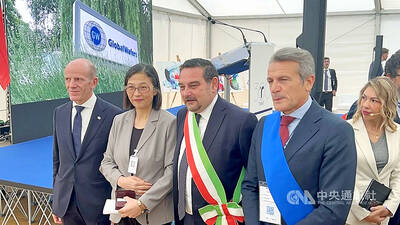Taiwanese footwear manufacturer Pou Chen Group (寶成集團) yesterday said that the company has decided to cancel a new raft of reward-and-punishment measures for Vietnamese workers at a production base in Dong Nai Province, amid an ongoing strike.
The company is one of the largest contract footwear manufacturers in the world, with clients such as Nike, Adidas, Reebok, Asics, Under Armour, New Balance, Puma, Converse, Salomon and Timberland.
Pou Chen said the strike is not expected to have any material impact on its production.
The company said it has also agreed to provide wages during the strike period, hoping workers would return to the production line today.
The strike started at a plant in Bien Hoa City, the capital of Dong Nai Province in southern Vietnam, on Thursday afternoon.
Foreign media outlets reported that about 17,000 employees out of about 21,600 workers at the plant went on strike over new company policies that cut their salaries for missing work.
Missing work with permission could also result in a loss of monetary rewards, according to reports in Vietnamese media outlets.
Pou Chen said it has been trying to deal with the issue by improving communications with the workers on strike and hoped to resolve the incident as soon as possible.
It was not the first time that the company faced a strike in Vietnam.
In March last year, thousands of workers went on strike at four factories employing more than 90,000 people over the Vietnamese government’s new pension rules.
Pou Chen set up production facilities for its footwear business in Dong Nai in 1994 and operates other production bases in Ho Chi Minh City, Tay Ninh and Tien Giang. The group employs about 160,000 workers in Vietnam.
Vietnam is just one of Pou Chen’s many production sites around the world. It also operates factories in Taiwan, China, Indonesia, the US, Mexico and other areas in Asia.
Pou Chen produces more than 300 million pairs of shoes per year, according to the company’s Web site. The group accounts for about 20 percent of the entire wholesale value of the global branded athletic and casual footwear market.

RECYCLE: Taiwan would aid manufacturers in refining rare earths from discarded appliances, which would fit the nation’s circular economy goals, minister Kung said Taiwan would work with the US and Japan on a proposed cooperation initiative in response to Beijing’s newly announced rare earth export curbs, Minister of Economic Affairs Kung Ming-hsin (龔明鑫) said yesterday. China last week announced new restrictions requiring companies to obtain export licenses if their products contain more than 0.1 percent of Chinese-origin rare earths by value. US Secretary of the Treasury Scott Bessent on Wednesday responded by saying that Beijing was “unreliable” in its rare earths exports, adding that the US would “neither be commanded, nor controlled” by China, several media outlets reported. Japanese Minister of Finance Katsunobu Kato yesterday also

‘DRAMATIC AND POSITIVE’: AI growth would be better than it previously forecast and would stay robust even if the Chinese market became inaccessible for customers, it said Taiwan Semiconductor Manufacturing Co (TSMC, 台積電) yesterday raised its full-year revenue growth outlook after posting record profit for last quarter, despite growing market concern about an artificial intelligence (AI) bubble. The company said it expects revenue to expand about 35 percent year-on-year, driven mainly by faster-than-expected demand for leading-edge chips for AI applications. The world’s biggest contract chipmaker in July projected that revenue this year would expand about 30 percent in US dollar terms. The company also slightly hiked its capital expenditure for this year to US$40 billion to US$42 billion, compared with US$38 billion to US$42 billion it set previously. “AI demand actually

Jensen Huang (黃仁勳), founder and CEO of US-based artificial intelligence chip designer Nvidia Corp and Taiwan Semiconductor Manufacturing Co (TSMC, 台積電) on Friday celebrated the first Nvidia Blackwell wafer produced on US soil. Huang visited TSMC’s advanced wafer fab in the US state of Arizona and joined the Taiwanese chipmaker’s executives to witness the efforts to “build the infrastructure that powers the world’s AI factories, right here in America,” Nvidia said in a statement. At the event, Huang joined Y.L. Wang (王英郎), vice president of operations at TSMC, in signing their names on the Blackwell wafer to

Taiwan-based GlobalWafers Co., the world’s third largest silicon wafer supplier, on Wednesday opened a 12-inch silicon wafer plant in Novara, northern Italy - the country’s most advanced silicon wafer facility to date. The new plant, coded “Fab300,” was launched by GlobalWafers’ Italian subsidiary MEMC Electronics Materials S.p.A at a ceremony attended by Taiwan’s representative to Italy Vincent Tsai (蔡允中), MEMC President Marco Sciamanna and Novara Mayor Alessandro Canelli. GlobalWafers Chairwoman Doris Hsu (徐秀蘭) said the investment marked a milestone in the company’s expansion in Europe, adding that the Novara plant will be powered entirely by renewable energy - a reflection of its